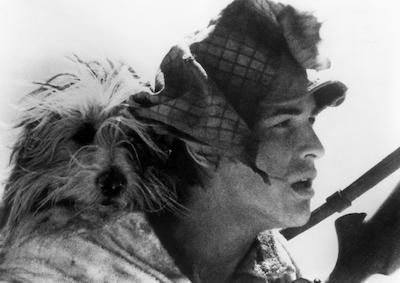Access every screening in the UCLA Festival of Preservation with a $50 pass.
Portrait (1971)
Restoration funding provided by the National Film Preservation Foundation.
Though Donna Deitch is best known for her feature film Desert Hearts (1986), the landmark lesbian love story, her career has had many distinctive stages, from documentarian to television director. Portrait is a wonderful example of her experimental film work. It was shot on a homemade optical printer in 1971, at a time when female filmmakers were rare.
Deitch displays a strong visual style with a cacophony of overlapping images and sounds. She has written that, “in order to express some of the conflicts and contradictions in the life and times of the character, I decided to shoot, cut, and print the film in the form of a bypack (at least two images running at once) and through the simultaneous juxtaposition of planned and spontaneous images so as to join separate realities to create or question a third.” The result of this juxtaposition is a surrealist representation of man’s impact on his environment.—Jillian Borders
16mm, color, 15 min. Distribution: Canyon Cinema Co-op. Producer: Donna Deitch. Director: Donna Deitch. Screenwriter: Donna Deitch. With: Tochkovitch. Sound by Ruth White, Pink Floyd, Humpback whales.
Preserved by UCLA Film & Television Archive from two 16mm prints. Laboratory services by FotoKem, Audio Mechanics, Simon Daniel Sound, DJ Audio, Inc. Special thanks to Donna Deitch.
A Boy and His Dog (1975)
Based on a cycle of stories by fantasy author Harlan Ellison, the filmed version of A Boy and His Dog was adapted from the original 1969 novella at first by Ellison himself, until his frustration with writer’s block caused filmmaker Jones and producer Alvy Moore to step in and expedite the process. Five years later, initial production began on the post-apocalyptic curio that would later rise to cult-classic status after its initial poor performance at the box office.
Set in the future year 2024 A.D. after the five-day World War IV has decimated all viable life above ground, the picture was shot on location on the outskirts of Barstow, California, situated within the naturally desiccated Mojave Desert. The filmmakers decorated the landscape with an estimated 50 tons of scrap metal, used tires, and other post-industrial detritus to create lean-tos, hovels, and various impromptu sets for the two leads to explore; the situation “Downunder,” however, shifts the final act into a Babes in Toyland-ish nightmarescape where saturated color feels like a visual assault far more aggressive than anything the film has shown us prior.
The testosterone-fueled, dim-witted Vic is our titular “boy,” played by a youthful, pre-Miami Vice Don Johnson, who navigates a Road Warrior-esque wasteland with his shaggy dog Blood, voiced by veteran voiceover actor Tim McIntire (best remembered as the disc jockey in American Hot Wax) and brilliantly realized by über-intelligent K9 performer Tiger. Director L.Q. Jones was purportedly astounded by Tiger’s performance, primarily because “he never, ever looks for a trainer. The dog watched Don,” elevating their relationship toe-to-toe with those found in the best buddy flicks of all time (The Odd Couple of course comes to mind).
Vic’s despicable, sexually-aggressive behavior might elicit a substantial cringe from contemporary audiences, but the unexpected final act, with its drastic and sudden Arthur Freed-inspired artificiality, restores our faith in his character, and successfully elicits sympathy for his dire circumstances.—K.J. Relth
DCP, color, 93 min. Production: L.Q. Jaf. Distribution: B & D Distributors. Producer: Alvy Moore. Director: L.Q. Jones Based on the novella by Harlan Ellison. Screenwriter: L.Q. Jones. Cinematographer: John Arthur Morrill. Editor: Scott Conrad.
Picture preserved by UCLA Film & Television Archive from 35mm Techniscope negative transfer overseen with L.Q. Jones, audio from original mag sources, surround sound. MTI Nova Restoration, Laboratory services and DCP by UCLA Film & Television Archive, Digital Media Lab.






 Mobile Navigation
Mobile Navigation

